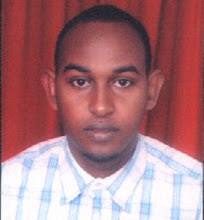Somalia, like many other African countries, has endured sustained militarization and armed conflict. This phenomenon has become a significant obstacle to Somalia's progress towards peace, justice, democratization, and development. As a rule of thumb: where militarization increases, so does death and destruction, and human rights abuses. And, yes, so does senseless wars.
Protracted wars, civil or otherwise, victimizes predominantly women and children; and nowhere is this fact more pronounced than in Somalia. Whether in refugee camps, or in the streets and neighborhoods of Somali cities, the grim images of women and children in profound state of anguish are evident. Nevertheless, their stories are seldom the dominant narrative.
Writes Sadia Ali Aden, Human rights advocate and freelance writer. Read More
Wednesday, May 4, 2011
Somalia: Manifestation of stealth trusteeship
Somalia is currently under what James Fearon and David Laitin of Stanford University call "a neo-trusteeship system". Various external powers, while disagreeing among themselves, make the important decisions for the Somali people.
On January 30, 2011, the Ethiopian-dominated Intergovernmental Authority on Development (IGAD), a regional organisation comprised of seven East African states, called for an extension of the Somali parliament's mandate. The dysfunctional Somali parliament duly understood the message sent by Addis Ababa and within three days unilaterally extended its mandate for three years.
The US and UN rejected the unilateral extension, with James Steinberg, the US deputy secretary of state, arguing that it would strengthen al-Shabab and Augustine Mahiga, the UN special representative for Somalia, joining in the chorus of criticism. The disagreement within the international community over Somalia was exposed, with Ethiopia and IGAD lining up on one side and the US and UN on the other.
The fact that agencies within the US have at times pursued different policies in Somalia adds another layer of complexity. The defence department views Somalia through the lens of the 'war on terror' and, as a result, allies itself with Ethiopia, while the state department is aligned more closely with the rest of the international community.
Writes Afyare A. Elmi who teaches international politics at Qatar University and is the author of Understanding the Somalia Conflagration: Identity, Political Islam and Peacebuilding. READ MORE
On January 30, 2011, the Ethiopian-dominated Intergovernmental Authority on Development (IGAD), a regional organisation comprised of seven East African states, called for an extension of the Somali parliament's mandate. The dysfunctional Somali parliament duly understood the message sent by Addis Ababa and within three days unilaterally extended its mandate for three years.
The US and UN rejected the unilateral extension, with James Steinberg, the US deputy secretary of state, arguing that it would strengthen al-Shabab and Augustine Mahiga, the UN special representative for Somalia, joining in the chorus of criticism. The disagreement within the international community over Somalia was exposed, with Ethiopia and IGAD lining up on one side and the US and UN on the other.
The fact that agencies within the US have at times pursued different policies in Somalia adds another layer of complexity. The defence department views Somalia through the lens of the 'war on terror' and, as a result, allies itself with Ethiopia, while the state department is aligned more closely with the rest of the international community.
Writes Afyare A. Elmi who teaches international politics at Qatar University and is the author of Understanding the Somalia Conflagration: Identity, Political Islam and Peacebuilding. READ MORE
Subscribe to:
Comments (Atom)
About the author of Sobbing Somali

- Abdullahi Jamaa
- Wajir, Northeastern, Kenya
- Abdullahi Jamaa is a Kenyan freelance journalist with reporting experience especially from the devastated Horn of Africa region. You can contact him by emailing: abdullahijamac@yahoo.co.uk